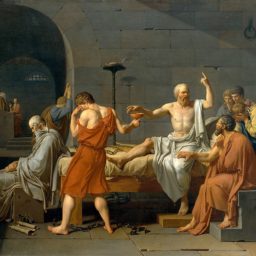
The most reliable antidepressant is rekindled curiosity, and only the curious try to draw bits of the world together into words. The word curious derives from the latin cura, which also gives us both cure and care. Curiosity is a cure for self-absorption, the cure being to care about the world and lay down roots … Continue reading Curiosity as the Ultimate Antidepressant Joe Moran

There seems to be a sort of fatality in my mind leading me to put at first my statement or proposition in a wrong or awkward form. Formerly I used to think about my sentences before writing them down; but for several years I have found that it saves time to scribble in a vile hand whole pages as quickly as I possibly can, contracting half the … | Charles Darwin Continue reading Scribbled Sentences Are Often Better Ones Than Those Written Deliberately Charles Darwin

I write to think, think to write, and converse to do both. Credit: David Gurteen Comment: I feel this quote beautifully captures the symbiotic relationship between writing, thinking, and conversation—each reinforcing and refining the other. In the spirit of Conversational Leadership, it highlights how dialogue isn’t just about exchange but about deepening understanding and catalyzing … Continue reading Writing, Thinking, Conversing—a Cycle of Insight David Gurteen


The process of writing can be a powerful tool for self-discovery. Writing demands self-knowledge; it forces the writer to become a student of human nature, to pay attention to his experience, to understand the nature of experience itself. By delving into raw experience and distilling it into a work of art, the writer is engaging in the heart and soul of philosophy – making sense out of life. | Georg Buehler Continue reading The Process of Writing Georg Buehler

The best way to gauge the quality of someone’s ideas isn’t to listen to them talking. It’s to read their writing. Compelling speakers can mask weak logic with strong charisma. Putting key points on a page exposes flawed reasoning. Compelling writing requires clear thinking. | Adam Grant Continue reading The Best Way to Gauge the Quality of Someone’s Ideas Adam Grant (2024)

You think that writing is communicating your ideas to your readers. It is not. What is professional writing? Professional writing, what is it? It’s not conveying your ideas to your readers. It’s changing their ideas. Nobody cares what ideas you have. Credit: Larry McEnerney Comment: This quote challenges the conventional view of writing as mere … Continue reading Changing Your Readers’ Ideas Larry McEnerney


If you do not know your readers, the particular people in a community, if you do not know these people, you are very unlikely to create value and you are very unlikely to be persuasive because persuasion depends on what they doubt. If you don’t know what they doubt, how on earth you’re gonna overcome those doubts? You must know them. | Larry McEnerney Continue reading Knowing Your Readers Larry McEnerney

Unlike a journalist, almost surely you are using your writing process to help yourself think. In other words, the thinking that you’re doing is at such a level of complexity that you have to use writing to help yourself do your thinking. | Larry McEnerney Continue reading You Have to Use Writing to Help Yourself Do Your Thinking Larry McEnerney

If it’s clear and useless, it’s useless. It’s organized and useless, it’s useless. It’s persuasive and useless, it’s useless. That’s the way it is. | Larry McEnerney Continue reading If It’s Clear and Useless – It’s Useless Larry McEnerney

If people cannot write well, they cannot think well, and if they cannot think well, others will do their thinking for them. | George Orwell Continue reading Writing as Thinking George Orwell

Critical Thinking The Vector of Great Conversations Close Pop-up all posts in this chapter What’s the Vibe? Please be patient as this may take up to a minute to load… Close AI tools are becoming common in writing, raising questions about their role and ethics. Many worry that using AI might undermine creativity or authenticity. … Continue reading Writing with AI Isn’t Necessarily Cheating Why it’s a legitimate tool for professionals and creators

Diplomacy ## Write to Think ** Close Pop-up all posts in this chapter What’s the Vibe? Please be patient as this may take up to a minute to load… Close Conventional writing wisdom is often misguided. Larry McEnerney, the retired director of the University of Chicago’s Writing Program, challenges outdated conceptions of good writing that … Continue reading Crafting Writing That Drives Change Larry McEnerney’s insights on good writing

Crafting Writing That Drives Change Cognitive Surplus Close Pop-up all posts in this chapter What’s the Vibe? Please be patient as this may take up to a minute to load… Close The advent of AI writing assistants like ChatGPT has led some to question whether writing by hand is still a critical skill. After all, … Continue reading Write to Think **

Chatbots and Genai in Knowledge Management From Mind to Information – the Role of AI in Knowledge Encoding Close Pop-up all posts in this chapter What’s the Vibe? Please be patient as this may take up to a minute to load… Close As AI increasingly shapes our world, we need to consider its effect on … Continue reading Artificial Intelligence and the Quest for Knowledge Exploring the parallels between Plato’s Phaedrus and the challenges of GenAI

Traditional writing emphasizes planning and clarity. This can stifle the raw, uncertain beginnings of creative thought. Vibe writing encourages starting without a plan, trusting rhythm and mood instead. Continue reading Vibe Writing Explained Writing that starts with emotion, not structure

In Plato’s Phaedrus, Socrates shares the myth of Thamus and Theuth, questioning the invention of writing. Writing, he argues, weakens memory and offers the appearance of wisdom without true understanding. Socrates suggests that serious discourse using the dialectic method is a nobler pursuit, leading to genuine wisdom and happiness. Continue reading The Myth of Thamus and Theuth Does writing allow the pretense of understanding, rather than true understanding?






